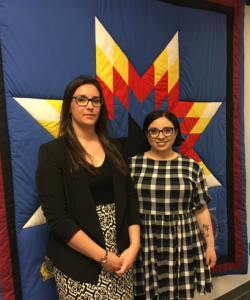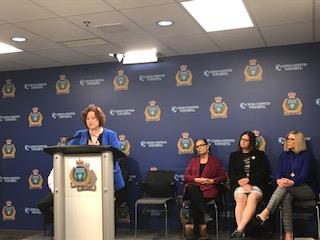Guest blog written by Jerra Fraser, Counsellor, Sexual Assault Crisis Program at Klinic Community Health
The Sexual Assault Crisis Program (SACP) is a counselling, advocacy, public education and crisis response program that aims to support survivors of sexual violence in a variety of capacities. We work towards creating an environment that reduces the impact of sexual assault in our society by providing direct client care and raising awareness through a trauma informed lens. We are part of a sexual assault response team in the city with the ability to support clients 24/7 during the medical/legal processes they choose to participate as well as being able to offer a sexual assault support telephone line for survivors and loved ones around the clock. We work from a model that prioritizes client choice and assists community members in making informed decisions that feel like the best fit them.
We are thrilled to be a part of facilitating the formalization of Third Party Reporting in partnership with Winnipeg Police and RCMP. Through working closely with Heart Medicine Lodge and Sage House, we believe this process has embodied the collaborative community spirit of representing diverse voices with like goals of caring for sexual violence survivors. This has been a project close to the hearts of the women who came before us and it is an honor to be a part of that that legacy of making change. Third Party Reporting is important as it provides survivors with more choice following an event that took choice away. Our program reviewed the form itself with a trauma-informed, client centered lens while prioritizing inclusivity and accessibility. We are excited that part of being as accessible as possible will include the ability to take rural reports over the phone and allow clients to choose, between multiple agencies, the one they are most comfortable attending.
Sexual Assault is one of the most underreported crimes due to a variety reasons. Contributing to these barriers are myths about sexual assault that create an experience of internalized victim blaming. Survivors often express fears around not being believed, worrying about if this will be perceived as their fault, that they somehow invited or could have prevented the sexual assault, and other layers of societal misconceptions that, when turned inward, can be very damaging. These often translate to the hesitation that can get in the way of feeling comfortable reporting to a formal system. Institutions (such as the legal system) can also be permeated by these myths and unintentionally uphold them through practices that are not rooted in trauma-informed care. Reporting directly to a formal system can feel intimidating and overwhelming following an event that can produce significant feelings of shame, fear, self-doubt, self-blame, uncertainty and guilt. Sexual Assault be can accompanied by a great deal of stigma, discomfort and aloneness making breaking the silence all the more challenging. Third Party Reporting allows space for individuals to start this process, or simply move their story, in a setting of their choosing within advocate agencies.
For many clients, neither a formal report nor saying nothing to police feels right for them; Third Party Reporting provides these individuals with a third option. We want to provide more options for survivors to address the very real barriers that can be experienced when making this personal decision. An additional option found in Third Party Reporting acknowledges these barriers and aims to minimize them. It realizes many survivors do not feel able or willing to disclose to police directly perhaps due to not feeling comfortable talking to police, having lost faith in the criminal justice system or feeling it may be re traumatizing to put themselves through the court process, but want to have their story heard by the legal system; they want to use their voice in a way that feels like ‘action’. Third Party Reporting allows survivors the opportunity to be heard by a system they might not otherwise access. The process of sharing their story in this way may feel empowering and therapeutic.
Survivors can complete a Third Party Report with the support of a trained worker from an advocate agency. Their identifying information will not be on the report itself which gets forwarded to law enforcement who may become aware of any themes captured by the reports and can be a tool to help law enforcement in certain cases such as identifying serial assaults. If law enforcement would like to discuss further with the survivor directly, they will contact the advocate agency at which time the third party reaches out to the survivor to make this decision. Third Party Reporting is not a substitute for a formal report or a 911 call but gives the survivor the option to say “yes” or “no” to involving police further. Some instances will not be able to remain anonymous due to mandatory investigation processes (such as domestic violence or child safety issues). The client will be given opportunity to make informed decisions about if this feels like the right fit for them through meeting with an advocate alongside exploring any resources that they may like to access.
Building on this climate of change and momentum we hope that in future, as a community we can continue to create space for additional innovative choices for survivors that reach beyond what is currently available for those who may not identify with the type of justice that includes punishment for offenders; our hope is that options such as restorative justice or healing circles may become more readily available for those who may find meaning in alternative experiences of justice.
This team approach to responding to community needs has allowed us to extend our empowerment model perspective that aims to constantly provide choice on the individual level to that of a systematic scale. It has been incredibly meaningful to come together with law enforcement and other agencies to support survivors and participate in this historical moment for both our program and our province.
With gratitude, SACP



